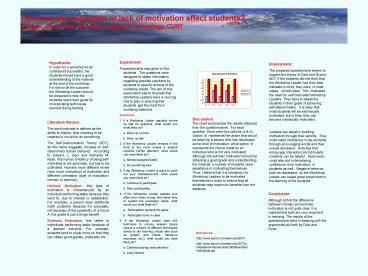Experiment: PowerPoint PPT Presentation
1 / 1
Title: Experiment:
1
How can my motivation or lack of motivation
affect students? Imogen Jones, New York City
College of Technology, CUNY
- Experiment
- A questionnaire was given to five students. The
questions were designed to obtain information
regarding possible reactions by students to
specific actions of the workshop leader. The aim
of this experiment was to illustrate that
Workshop Leaders have a very big role to play in
ensuring that students get the most from
workshop sessions. - Questions
- If a Workshop Leader regularly shows up late for
sessions, what would you most likely do? - a. Show up on time
- b. Show up late
- 2. If the Workshop Leader remains in the front of
the room unless a student requires his/her
attention, what would you most likely do? - a. Attempt assigned tasks
- b. Do something else
- 3. If the Workshop Leader is quick to point out
your mistakes/errors, what would you most likely
do? - a. Continue to participate
- b. Stop participating
- 4. If the Workshop Leader praises your effort
even when wrong, then takes time to explain the
necessary steps, what would you most likely do? - a. Participation remains the same
- b. Participate more in class
- 5. If the Workshop Leader uses one technique to
convey session topics versus a mixture of
different techniques aimed to aid learning
(visual aids such as graphs and charts, hands-on
exercises, etc.), what would you most likely do? - a. Continue paying close attention
- b. Lose interest
Hypothesis In order for a workshop to be
considered successful, the students should have a
good understanding of the material at the end of
the workshop. For this to be the outcome the
Workshop Leader should be prepared to help the
students reach their goals by incorporating
techniques learned during training.
Implications The prepared questionnaire seems to
support the theory of Deci and Ryans SDT. If the
students did not think that the Workshop Leader
had their best interests in mind, they were, in
most cases, unmotivated. This illustrated the
need for self-motivated Workshop Leaders. They
have to assist the students in their goals of
achieving self-determination. It is likely that
most students will be extrinsically motivated,
but in time, they can become intrinsically
motivated. Leaders can assist in building
motivation through their actions. They could
instill confidence in the students through
encouraging words and their overall demeanor.
Activities that encourage interaction and
stimulate creativity can be helpful. Team-work
could also aid in developing confidence, thus
motivation, in students as well. Negative
behavior, such as disrespect, by the Workshop
Leader can cause great impairment in the learning
of the students.
Discussion The chart summarizes the results
obtained from the questionnaires. For each
question, there were two options (a b). Option
a represents the action that would be taken by
a person who has developed some level of
motivation, while option b represents the
choice made by an individual who is not very
motivated. Although the extrinsic motivation
should be obtaining a good grade and
understanding the material, a number of students
need assistance in motivating themselves. Thus,
I believe that it is necessary for Workshop
Leaders to be motivated themselves in order to
ensure that all students reap maximum benefits
from the sessions.
Literature Review The word motivate is defined
as the ability to inspire, thus meaning to be
inspired or moved to do something. The
Self-Determination Theory (SDT), as the name
suggests, focuses on self-determined human
behavior. According to Edward L. Deci and
Richards M. Ryan, this human tendency of being
self-motivated is not automatic, but has to be
cultivated. Humans have different levels (how
much motivation) of motivation and different
orientation (type of motivation- intrinsic or
extrinsic). Intrinsic Motivation this type of
motivation is characterized by an individual
performing tasks because they want to, due to
interest or satisfaction. For example, a person
does additional math problems because its
enjoyable, not because of the possibility of a
future A, the grade is just a fringe
benefit. Extrinsic Motivation this refers to
individuals performing tasks because of a desired
outcome. For example, students tend to study more
so that they can obtain good grades, preferably
As.
Conclusion Although at first the difference
between intrinsic and extrinsic motivation is not
quite clear, it is realized that both are very
important in learning. The results of the
questionnaire were in keeping with the arguments
put forth by Deci and Ryan.
References http//www.psych.rochester.edu/SDT/ ht
tp//www.psych.rochester.edu/SDT/publications/manu
scripts/2000RyanDeciIntExtDefs.pdf

